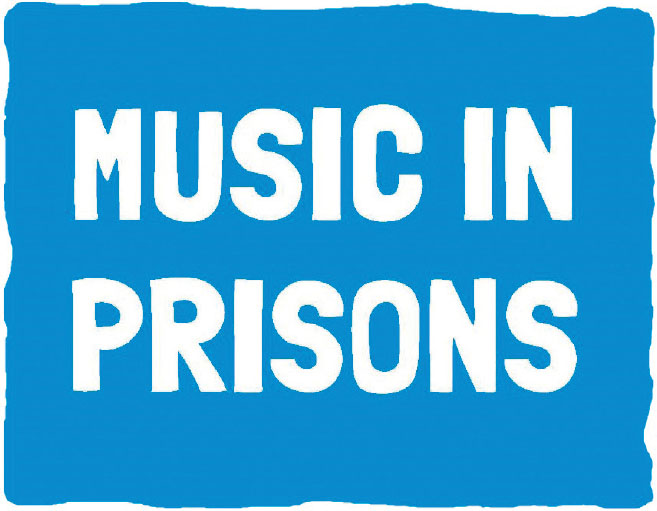
‘End of the day, dreams slip through… Sleepy eyes, sleep tight, sleep tight, sleepy eyes…’
The soothing lyrics and gentle, repetitive chant of the chorus evokes nursery tales and childhood lullabies. But the women who created the song may have to wait some time before they are able to sing it to their own children. ‘Sleepy Eyes’ was written as part of a Music in Prisons project, to help women on the inside connect with their families on the outside – and perhaps reflect on their own early years in the process.
The project – undertaken by Music in Prisons, part of the Irene Taylor Trust (ITT) – saw prisoners in Askham Grange, Low Newton and Durham work with a writer, an artist and a musician to devise a series of songs that were later made into a songbook. It is one of many success stories since 1995, when the charity was established in the memory of Irene Taylor, wife of the late Lord Chief Justice Peter Taylor.
‘Music provides positive relief and colour in what is a grey and stressful situation,’ says ITT's artistic director Sara Lee. ‘We believe creating original music collaboratively has a powerful and positive impact on peoples’ lives, bringing new confidence, important transferrable skills and raised aspirations for the future. Music can break down barriers and help people who have found themselves on the fringes of society to become celebrated and valued members of the community.’

As well as helping people of all ages in prisons, the ITT also supports young people not in employment, education or training (NEETs) and ex-prisoners as they rebuild their lives on release. ‘Creating original music is at the core of every project’ says Lee.
Despite tabloid depictions of a cushy life behind bars, for most inmates serving a sentence is tough. For many prisoners, incarceration is the culmination of long periods of abuse, addiction, isolation, mental health issues, homelessness and a lack of support networks. ‘When prisons are used for punishment rather than for rehabilitation, there is a detrimental effect on our communities and the wider society over both the short and the longer term,’ explains Lee. ‘There are pockets of brilliant work happening, and much of it is delivered by small charities. However, for the vast majority of those inside, nothing much will change, despite the very best efforts of so many. The task is huge and has a direct bearing on the cohesion of society, yet it is given little support to succeed.’
Access to music
However, given that music provision on a wider scale is suffering from reduced resources, some may argue that the activity would be better directed to schools or therapy centres. ‘I feel strongly that absolutely everyone should have access to music, no matter where they live, where they find themselves or where they have come from,’ Lee argues, convincingly. ‘It just so happens that my career has taken me in this particular direction. Prisons and the people in them are part of our communities and all but a very small number will be released back into them at some point. Offering people new opportunities and choices when they are inside will mean different options will be open to them upon release, thereby ensuring that communities become safer, more coherent, and function more effectively and positively for all of us.’
In 2013 Music in Prisons won an RSPH (Royal Society of Public Health) award to recognise the long-term impact of its work. Evaluations – such as ‘Beats & Bars’, undertaken by the Institute of Criminology, University of Cambridge – found that the skills fostered by Music in Prisons helped people with negative experiences of formal education to engage in further training opportunities, thus reducing the likelihood of reoffending.
Non-criminal detention
It's not just criminals who are detained. Immigration detention is the practice of holding people in custody while they wait for permission to enter the UK or face deportation. Unlike a prison sentence, there is no time limit on immigration detention, and even though detention is supposed to be used sparingly, around 30,000 people are held each year – sometimes for extended periods.
Music in Detention works with detainees to bring them together with local communities and professional musicians, to provide a creative space and a way of expression. The group has existed since 2005 and delivers over 200 workshops a year in places such as Portland, Dover and Oxford. Most detainees are asylum seekers, and as such, many have faced challenging or traumatic backgrounds. Music has been shown to provide some relief to the psychological stress caused by being detained, which one immigrant compared to being alive in a coffin.
Some of the ideas developed by the ITT are being shared internationally. At the time of this interview, Lee is in Chicago, working with members of the Chicago Symphony Orchestra (CSO) and the Civic Orchestra on a number of creative projects. ‘Riccardo Muti [CSO director] announced that he wanted his musicians to use their skills in a variety of settings away from the concert platform. Our patron, Mark-Anthony Turnage, mentioned that we had been doing this work for a long time – it's relatively new in the US. Since 2013 we have been invited to lead, support and train a number of CSO and Civic Orchestra musicians to deliver projects with young men in detention and we've also worked with teen parents to write lullabies for their children.’
Lee is currently working with young men aged 15-18 in Illinois Youth Center, helping them to write and perform new music for a show that their families will be invited to attend. She'll then collaborate with cellist Yo-Yo Ma to work with parents who have lost children to gun crime, supporting them to write songs in remembrance. It's impressive and ground-breaking work, and further proof – if proof were needed – that music is universal.








